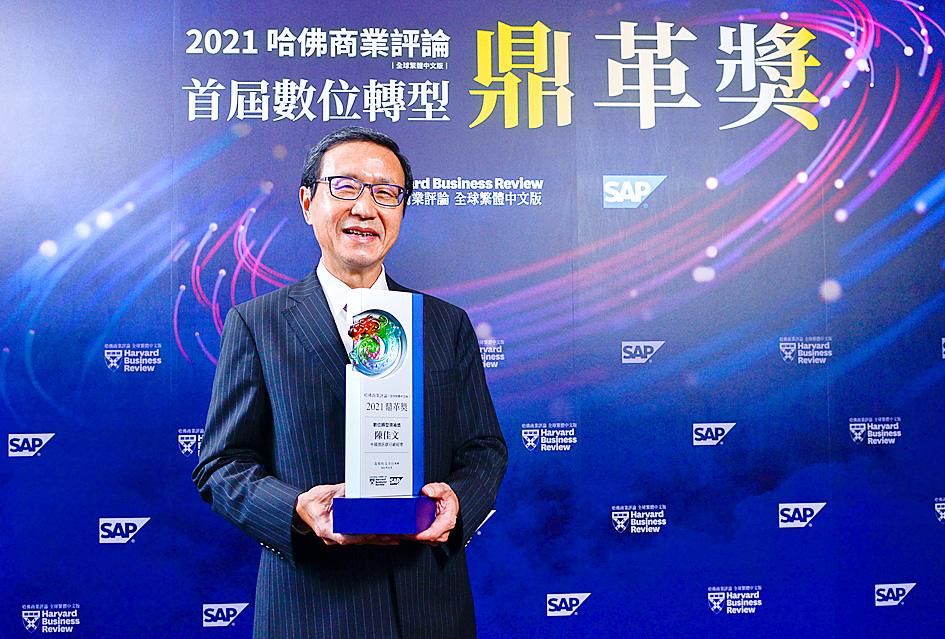CTBC Bank (中國信託銀行) last week won three awards at the first Harvard Business Review Complex Chinese Edition Digital Transformation Award for its efforts in promoting digital innovation.
At a ceremony on Wednesday, CTBC president James Chen (陳佳文) was awarded the Digital Transformation Leader Award, while CTBC Bank was honored with the Integrated Digital Transformation Pioneer Award in the service sector and the bank’s online loan platform received the Operational Excellence and Transformation Award.
The award organizer praised CTBC for innovating and promoting digital transformation, and its success in connecting diversified consumer ecosystems by modeling various financial scenarios.

Photo courtesy of CTBC Bank
Awarding Chen with the Digital Transformation Leader Award recognizes his role as a key player in the bank’s digital transformation, it said.
To meet customers’ expectations, Chen not only transformed the overall banking service experience, but also integrated the organization to improve efficiency, creating an agile and innovative digital concept and environment, while leading his colleagues to work together, it added.
Chen said banks must always provide services that are readily available.
“From the perspective of customers, providing a good digital financial experience and completely transforming existing businesses is what we must do,” he said.
“In addition, CTBC has a diversified organization, with various units responsible for the front, middle and back offices, where the working habits and personality traits of technology and finance talent are quite different. Therefore, the role of the president is to allow everyone to collaborate smoothly, to provide colleagues of different cultures with the greatest flexibility, and to keep them united to work together toward a common goal,” he added.
The COVID-19 pandemic has accelerated customer demand for digital finance, and CTBC said its vision for digital transformation includes two major goals: digital end-to-end services and banking everywhere.
To achieve the digital end-to-end goal, the bank redefined and redesigned its financial service process, and constructed a smooth, efficient and valuable customer experience based on the perspective of customers.
To reach the goal of banking everywhere, it adopted a cross-industry alliance strategy, providing financial services in daily life, so customers do not need to go to physical branches and can use the bank’s services anytime and anywhere.
CTBC’s online loan platform, which won the Operational Excellence and Transformation Award, is to make customer needs its core focus, and optimize customer service, application review and operation procedures, with the aim of establishing a complete database system and striving to develop more personalized services.

NEW IDENTITY: Known for its software, India has expanded into hardware, with its semiconductor industry growing from US$38bn in 2023 to US$45bn to US$50bn India on Saturday inaugurated its first semiconductor assembly and test facility, a milestone in the government’s push to reduce dependence on foreign chipmakers and stake a claim in a sector dominated by China. Indian Prime Minister Narendra Modi opened US firm Micron Technology Inc’s semiconductor assembly, test and packaging unit in his home state of Gujarat, hailing the “dawn of a new era” for India’s technology ambitions. “When young Indians look back in the future, they will see this decade as the turning point in our tech future,” Modi told the event, which was broadcast on his YouTube channel. The plant would convert

‘SEISMIC SHIFT’: The researcher forecast there would be about 1.1 billion mobile shipments this year, down from 1.26 billion the prior year and erasing years of gains The global smartphone market is expected to contract 12.9 percent this year due to the unprecedented memorychip shortage, marking “a crisis like no other,” researcher International Data Corp (IDC) said. The new forecast, a dramatic revision down from earlier estimates, gives the latest accounting of the ongoing memory crunch that is affecting every corner of the electronics industry. The demand for advanced memory to power artificial intelligence (AI) tasks has drained global supply until well into next year and jeopardizes the business model of many smartphone makers. IDC forecast about 1.1 billion mobile shipments this year, down from 1.26 billion the prior

People stand in a Pokemon store in Tokyo on Thursday. One of the world highest-grossing franchises is celebrated its 30th anniversary yesterday.

Zimbabwe’s ban on raw lithium exports is forcing Chinese miners to rethink their strategy, speeding up plans to process the metal locally instead of shipping it to China’s vast rechargeable battery industry. The country is Africa’s largest lithium producer and has one of the world’s largest reserves, according to the US Geological Survey (USGS). Zimbabwe already banned the export of lithium ore in 2022 and last year announced it would halt exports of lithium concentrates from January next year. However, on Wednesday it imposed the ban with immediate effect, leaving unclear what the lithium mining sector would do in the